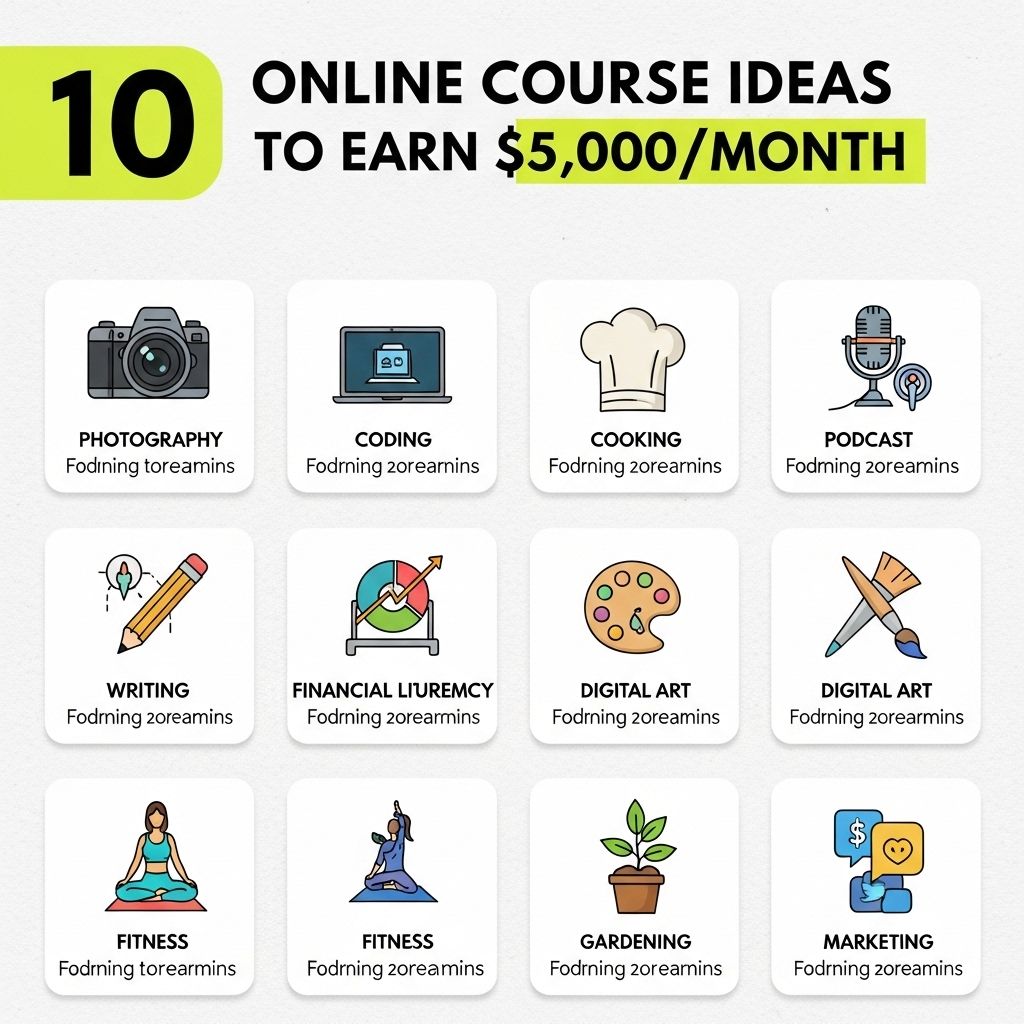In today’s digital age, the opportunity to share knowledge and expertise online has become more accessible than ever. Many individuals are leveraging their skills to create online courses, helping others while generating significant income. If you’re looking to earn around $5,000 a month, here are ten compelling online course ideas that can attract learners and provide you with a steady revenue stream.
Table of Contents
1. Digital Marketing Mastery
Digital marketing encompasses various strategies that businesses use to promote their goods and services. Developing a comprehensive course on digital marketing can attract a diverse audience, from entrepreneurs to corporate professionals. Consider covering the following topics:
- Search Engine Optimization (SEO)
- Social Media Marketing
- Email Marketing Strategies
- Content Marketing Techniques
- Pay-Per-Click Advertising
Course Structure:
- Introduction to Digital Marketing
- Understanding Your Audience
- Creating a Content Strategy
- Measuring Success with Analytics
2. Graphic Design Fundamentals
With the rise of visual content, graphic design skills are in high demand. A course that teaches the fundamentals of graphic design can appeal to aspiring designers, marketers, and business owners. Key areas to focus on include:
- Design Principles
- Using Design Software (Adobe Illustrator, Photoshop)
- Creating Effective Branding
- Typography and Color Theory
Learning Outcomes:
By the end of the course, students should be able to:
- Create their own logos and branding materials
- Understand and apply design principles effectively
- Use design tools proficiently
3. Programming 101: Learn to Code
As technology evolves, coding remains a fundamental skill. Offering a beginner’s course in programming can attract individuals looking to switch careers or enhance their skillset. Consider covering:
- Basic Programming Concepts (variables, loops, functions)
- Languages (Python, JavaScript, HTML/CSS)
- Building Simple Projects
- Debugging and Problem-Solving
Course Format:
| Week | Topics Covered | Assignments |
|---|---|---|
| 1 | Introduction to Programming | Basic Exercises |
| 2 | Python Basics | Mini Project |
| 3 | Web Development Basics | HTML/CSS Project |
4. Personal Finance and Budgeting
Many individuals struggle with managing their finances. A course focusing on personal finance and budgeting can help students take control of their finances. Key topics might include:
- Creating a Budget
- Understanding Credit Scores
- Investing Basics
- Debt Management Strategies
Engagement Strategies:
- Interactive Budgeting Tools
- Weekly Live Q&A Sessions
- Access to Exclusive Financial Resources
5. Health and Wellness Coaching
With an increasing focus on health, creating a course centered on health and wellness coaching can attract a wide audience. Topics to explore include:
- Nutrition Basics
- Exercise and Fitness Routines
- Mental Health and Well-being
- Creating Personalized Health Plans
Target Audience:
Consider tailoring the course for:
- Busy professionals
- Parents
- Students
- Anyone looking to improve their health
6. Photography Skills for Beginners
Photography is an art form that many wish to explore. A course teaching photography can cater to enthusiasts who want to improve their skills. Focus areas include:
- Camera Basics
- Composition Techniques
- Lighting and Exposure
- Photo Editing
Interactive Elements:
Incorporate elements such as:
- Photo Challenges
- Feedback on Student Work
- Guest Interviews with Professional Photographers
7. Crafting and DIY Projects
Many people are turning to crafting as a hobby or side business. A course focusing on various crafting techniques can attract creative individuals. Potential topics include:
- Basic Sewing Techniques
- DIY Home Decor Projects
- Upcycling and Reusing Materials
- Crafting for Children
Course Delivery:
- Video Tutorials
- Printable Patterns and Guides
- Community Support Forum
8. Advanced Excel Skills
Excel is a powerful tool used in various industries. Offering a course that delves into advanced Excel skills can benefit professionals looking to enhance their capabilities. Key skills might include:
- Data Analysis Techniques
- Pivot Tables and Charts
- Macros and VBA Programming
- Data Visualization
Course Benefits:
Students can expect to:
- Streamline their workflows
- Improve data handling and reporting
- Enhance career opportunities
9. Social Media Strategy for Businesses
Businesses must navigate the complexities of social media to engage their audiences effectively. A course on social media strategy can empower business owners and marketers. Focus areas include:
- Platform-Specific Strategies
- Engagement Tactics
- Content Creation and Curation
- Monitoring and Analytics
Outcome Measurement:
Help students measure their success by teaching them how to:
- Set Social Media Goals
- Analyze Engagement Metrics
- Adjust Strategies Based on Performance
10. Language Learning for Professionals
In a globalized world, language skills are invaluable. Creating a language course tailored for professionals can help individuals excel in their careers. Consider focusing on:
- Business Vocabulary
- Conversational Practice
- Cultural Nuances
- Industry-Specific Terminology
Course Features:
- Interactive Learning Sessions
- Real-life Business Scenarios
- Access to Language Resources
Final Thoughts
Creating and selling online courses can be a lucrative venture. With the right blend of content, market research, and engagement strategies, anyone can potentially earn $5,000 a month or more. Choose a course idea that resonates with your expertise and passion, and start your journey in the world of online education today!
FAQ
What types of online courses can help me earn $5,000 a month?
Courses in high-demand fields like digital marketing, coding, graphic design, personal finance, and health & wellness can potentially generate significant income.
How do I identify a profitable niche for my online course?
Research current market trends, analyze competitors, and consider your own expertise and passion to find a niche that combines demand with your skills.
What platforms are best for hosting my online course?
Popular platforms include Udemy, Teachable, and Thinkific, which offer user-friendly interfaces and marketing tools to help you reach your audience.
How can I effectively market my online course?
Utilize social media, email marketing, and content marketing strategies, such as blogging or webinars, to attract potential students to your online course.
What is the typical price range for an online course?
Online courses can range from $50 to $500 or more, depending on the depth of content, niche, and target audience; pricing strategies should reflect the value offered.
How long does it take to create an online course?
The time required can vary widely, but on average, developing a course can take anywhere from a few weeks to several months, depending on the complexity and your preparation.









